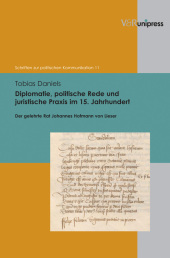 Neuerscheinungen 2013Stand: 2020-01-07 |
Schnellsuche
ISBN/Stichwort/Autor
|
Herderstraße 10
10625 Berlin
Tel.: 030 315 714 16
Fax 030 315 714 14
info@buchspektrum.de |

Tobias Daniels
Diplomatie, politische Rede und juristische Praxis im 15. Jahrhundert
Der gelehrte Rat Johannes Hofmann von Lieser
2013. 581 S. 24.5 cm
Verlag/Jahr: V&R UNIPRESS 2013
ISBN: 3-8471-0092-0 (3847100920)
Neue ISBN: 978-3-8471-0092-8 (9783847100928)
Preis und Lieferzeit: Bitte klicken
Erfolgreiche Politik im Spätmittelalter
Politik ist erheblich durch Kommunikation bedingt. Für den Erfolg von Politik sind insbesondere für das Spätmittelalter die Träger der politischen Kommunikation wichtig. Welche Bedeutung kam ihnen zu? Wie prägten sie politische Diskurse und Prozesse? Diese Fragen werden anhand der Vita des gelehrten Rates und Gesandten deutscher Kurfürsten, Johannes Hoffmann von Lieser bzw. Lysura ( 1459), exemplarisch untersucht. Im Blickpunkt steht erstens Liesers diplomatische Karriere. Der Fokus liegt hier auf seiner politischen Rolle hinsichtlich des Konzils von Basel (1431-1447) und der ´Reichsreform´ und auf seinem Engagement als Professor für kanonisches Recht. Zweitens werden Liesers politische Reden auf den Reichsversammlungen von Regensburg und Frankfurt am Main (1454) analysiert. Es wird gezeigt, dass die Diffusion politischer Texte im 15. Jahrhundert auch davon abhing, ob sie oratorisch verwertbar waren. Im Zentrum des dritten Abschnitts steht Liesers bisher unbekanntes juristisches Schaffen. Wie arbeitete Lieser als Jurist? Was trägt seine Prägung als Jurist zu seiner Statur als Politiker bei?
This book deals with the life and work of the learned counsellor Johannes Hofmann von Lieser (Lysura) ( 1459), a close friend of Nicholas of Cusa, known for the political verse Cusa et Lysura pervertunt omnia iura . The thesis is examining principally three topics: (1) First, the diplomatic career of Lieser, with a focus on his political role in the German politics towards the Council of Basle (1431-1447) and in the so called Reichsreform in the 1450s, and third on Liesers engagement as a professor of Canon Law at the University of Louvain from 1456 to 1458.
(2) The second part analyses Liesers political speeches at the imperial diets of Regensburg and Frankfurt am Main (1454). Thematically, the analysis regards chiefly the Reichsreform , but also the history of the Teutonic Order. Methodologically, two different aims of political speech are juxtaposed: on the one hand the rhetorical approach of German learned counsellors, on the other hand the humanistic one, represented by Enea Silvio Piccolomini, who revised one of Liesers speeches. Furthermore, it is shown that the diffusion of political texts in the fifteenth century depended not exclusively, but also on their applicability in oratory, as learned counsellors worked with these texts as professional orators. (3) The third part is dedicated to Liesers up to now completely unknown juridical work. Several consilia and a repetitio are analysed in order to show how Lieser worked as a jurist and how he the profile of learned counsellors as jurists can contribute to a better understanding of them as politicians.


